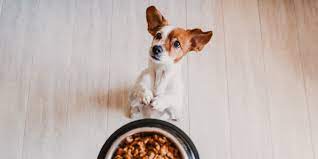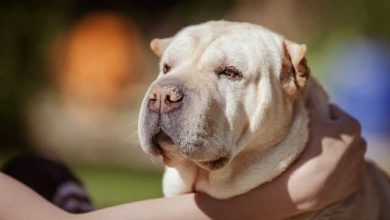Why Does My Dog Hate Puppies?
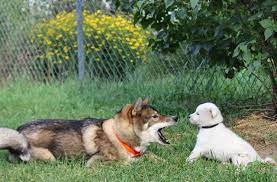

Having a new puppy in the house can be an exciting and joyful experience for many dog owners. However, sometimes our canine companions may display a strong aversion towards puppies, leaving us wondering, “Why does my dog hate puppies?” In this article, we will explore the possible reasons behind this behavior and discuss strategies to address it effectively.
Factors contributing to a dog’s dislike of puppies
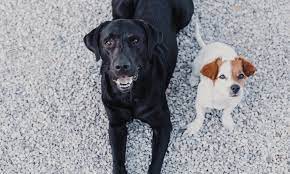

- Lack of socialization: Dogs that have not been adequately socialized during their early developmental stages may find it challenging to tolerate the presence of puppies. Limited exposure to other dogs and puppies can result in fear or uncertainty.
- Previous negative experiences: If a dog has encountered unpleasant interactions or traumatic incidents involving puppies in the past, it can lead to a lasting aversion. Negative experiences such as being bitten, chased, or excessively bothered by puppies can shape a dog’s negative perception.
- Resource guarding: Some dogs may exhibit possessive behaviors over their resources, such as food, toys, or attention. When a puppy approaches these resources, it can trigger a defensive response from the adult dog, causing them to show aggression or hostility.
Behavioral signs of a dog hating puppies
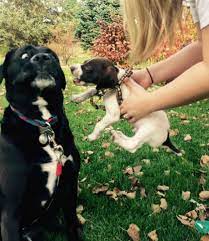

- Aggressive behaviors: Dogs that dislike puppies may display aggressive behaviors towards them. This can include growling, snarling, snapping, or even biting. These aggressive actions are often a result of the dog trying to establish dominance or protect their territory.
- Avoidance or withdrawal: Dogs that dislike puppies may actively avoid or try to escape from their presence. They might retreat to a separate room, hide, or even refuse to interact with the puppy. This behavior indicates their discomfort and desire to distance themselves from the younger dog.
- Body language cues: A dog’s body language can reveal their feelings towards puppies. Signs of discomfort or dislike include tense body posture, raised hackles, pinned-back ears, a stiff tail, or direct and prolonged eye contact.
Understanding the reasons behind a dog’s dislike of puppies
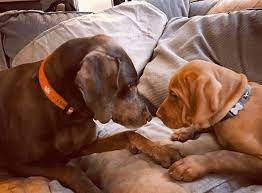

- Fear or anxiety: Some dogs may feel anxious or fearful around puppies due to their unpredictable behavior, high energy levels, or lack of social skills. These dogs may perceive puppies as a threat or a source of stress, leading to negative reactions.
- Establishing dominance: Adult dogs may exhibit dislike towards puppies as a means of asserting their dominance and maintaining their position in the household hierarchy. They may see the puppy as a potential challenger and attempt to establish their authority.
- Lack of maternal instinct: Not all dogs possess a strong maternal instinct towards puppies, especially if they have not had prior experience with their own litters. Without the nurturing instinct, some dogs may show indifference or even aggression towards puppies.
Strategies to address a dog’s aversion toward puppies
- Gradual introduction and positive associations: Introduce the adult dog and the puppy in a controlled and supervised environment. Gradually increase their interactions while providing positive reinforcement, such as treats or praise, for calm and tolerant behavior. This approach helps the dog associate puppies with positive experiences.
- Professional dog training and behavior modification: Consult with a professional dog trainer or behaviorist who can assess the situation and provide tailored training techniques. They can guide you in using desensitization and counter-conditioning methods to change your dog’s negative associations with puppies.
- Managing the environment: Create separate spaces for the adult dog and the puppy to prevent conflicts and reduce stress. Use baby gates or crates to establish boundaries and allow for gradual introductions. This way, both dogs can coexist peacefully while getting accustomed to each other’s presence.
Importance of seeking professional help
It is crucial to seek professional help when dealing with a dog’s aversion towards puppies. A qualified dog trainer or behaviorist can provide expert guidance, develop a customized behavior modification plan, and ensure the safety and well-being of both the adult dog and the puppy.
See also: Red Australian Cattle Dog Puppies: Characteristics, Care, and Training
Conclusion
While it can be disheartening to witness our dog’s aversion towards puppies, it is essential to understand the reasons behind their behavior and take appropriate steps to address it. By providing gradual introductions, positive associations, and seeking professional assistance if needed, we can help our dogs overcome their dislike of puppies and foster a harmonious environment for all.
FAQs about why my dog hate puppies
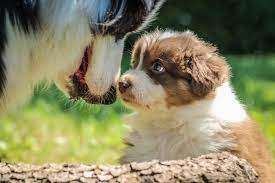

Here are the most FAQs about why does my dog hate puppies:
Can all dogs learn to accept puppies?
Not all dogs are naturally inclined to enjoy the presence of puppies, but with proper training, patience, and professional guidance, most dogs can learn to tolerate and coexist with puppies.
Should I punish my dog for showing aggression towards puppies?
Punishment is not recommended as a solution for a dog’s aggression towards puppies. It can worsen the behavior and create a negative association. Positive reinforcement and behavior modification techniques are more effective and humane approaches.
Can neutering or spaying my dog help reduce their aversion towards puppies?
Neutering or spaying your dog may have positive effects on their behavior and temperament. However, it is not a guaranteed solution for their aversion towards puppies. Consult with a veterinarian or behaviorist for personalized advice.
See also: How Many Puppies Can You Expect in a Jack Russell’s First Litter?
Is it possible for a dog to develop a liking for puppies over time?
Yes, it is possible for a dog to develop a liking for puppies with proper training, socialization, and positive experiences. Dogs are capable of learning and adapting their behavior over time.
Are there any breeds that are more likely to dislike puppies?
While certain breeds may have predispositions towards specific behaviors, such as being more territorial or independent, a dog’s dislike towards puppies is not solely determined by breed. Each dog’s temperament and individual experiences play a significant role in their behavior.

